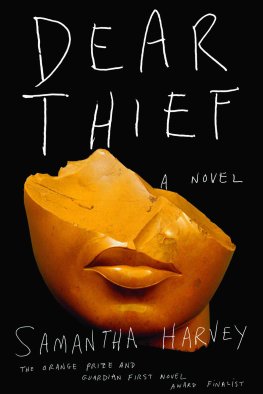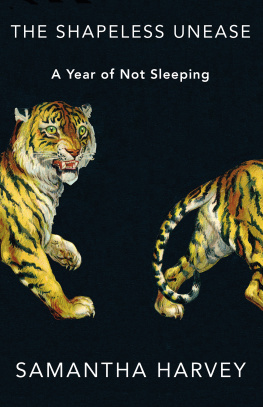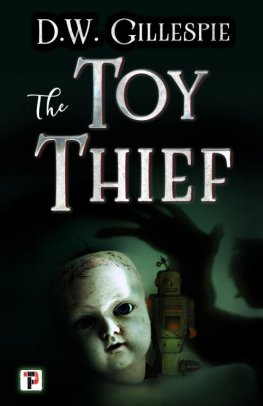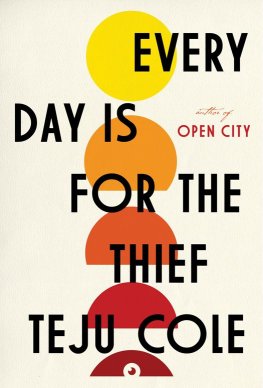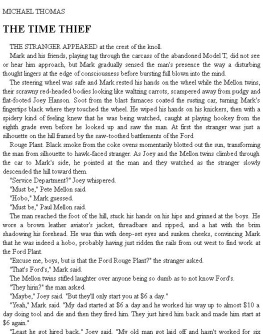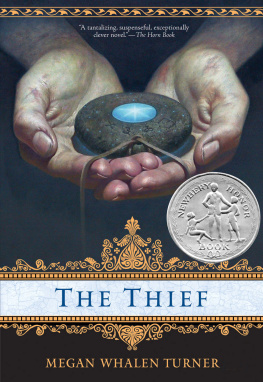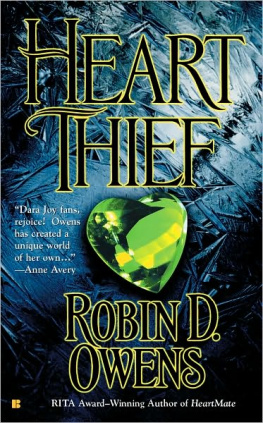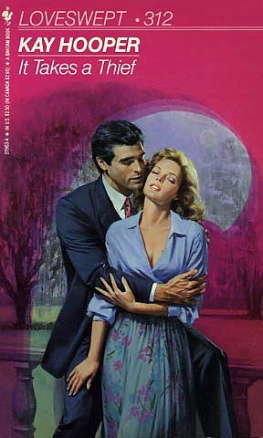Samantha Harvey
Dear Thief
Ill write to you. A super-long letter, like in an old-fashioned novel.
Haruki Murakami, After Dark
In answer to a question you asked a long time ago, I have, yes, seen through what you called the gauze of this life. But to tell you about it I will have to share with you a brief story.
One night in the hot summer of 76 I was staying with my grandmother, who was dying, and I was reading a book of Buddhist stories. My grandmother was asleep in the rocking chair, inhaling with feathered breaths. Her exhales were smooth and liquid, which seems to me now the surest sign of a lifes exit when the act of giving away air is easier than that of accepting it. In fact I knew she might be facing her last night but I didnt do much to cling to those moments. I was sitting on the sofa in my underwear with my legs drawn to the side, watching her for minutes at a time while the breaths fluttered in through the dignified gap between her lips. She was sweating around her brows, and at the base of her throat. I remember vividly her sapphire pendant in the dip there where the skin was moist.
My grandmother had gone beyond the point of caring about death. Shed phoned me the previous night to say she was on her way to the ever-after and could do with somebody to feed the dog; I never did know what she thought would happen to the dog after she was gone, though maybe she had no concept of after, or no stomach for it. When I had spoken to her I called my parents at their hotel in Kerala in India and told my father that his mother was dying; I packed a small number of things, including the book of Buddhist stories on my parents bookshelves, and made the journey to London the next morning.
It had meant walking at first light from Morda to Oswestry, to catch a bus to Shrewsbury, to catch a train to London. I went along the lane that you and I had walked so many times, from my house to Morda village, one-and-a-half wingspans wide and hedges of six feet, crossing brooks and dipping away from sight only to appear again in triumph five hundred yards later, shaking the valley off its back. Gently monstrous; roaring in the glory of spring or summer. This is how I think of that landscape when I stop to remember although I know, before you raise a sceptical brow, the over-optimism of memory.
My mother had told me to take money from the cloisonn box on the kitchen dresser for the train fare. I was twenty-four but I had almost nothing of my own. This is what happens when there are cloisonn boxes in the kitchen and folded leather wallets in the pocket of a father who so brims with a love he cant fathom that he must give and give in order not to suffocate with the excess a daughter who isnt so much spoilt as made resourceless and who lives life in a state of constant guilty gratitude. Though happy all the same; I wouldnt want you to think otherwise.
It would take at least two days for my parents to get back from India; that was why I left Morda early, because it was me, and me alone, who would see my grandmother leave this world. That was the first time I ever did something for which somebody else could be truly grateful and is why I remember that walk along the lanes and the journey to London and the sweat on my grandmothers throat. I remember it because it was the first time I felt neither indebted nor childlike, as if the whole kindly legacy that was my parents had been removed from the equation and left me freshly sprung on the sofa in the heat of the evening and the presence of death defiant of death, but somehow courting it too. Now and again my grandmother would wake up, look at me, smile vaguely, then sleep.
The Buddhist stories I was reading that night were about discipline and faith and letting go of the things that are liable to pass. There is the man who grieves so much for the son he thinks has died that he refuses to accept, years later, the man who returns and calls him Father. Do not cling so hard to your own version of the truth, says Buddha, else you will fail to see the real truth when it comes knocking. There is the story of teacups: the student asks the master why Japanese teacups are so delicate and easy to break. The master tells the student that it isnt that the teacups are too delicate, but that the person who drinks from them is too heavy-handed. Its not for teacups or grass or mountains to change, says Buddha. It is for us to adapt to what is. Do not clutch, do not judge, let pass. Everything is impermanence.
It wasnt at this point that I saw through your gauze of life, though; actually, far from it. In my grandmothers hot, silent room, nothing had ever seemed more permanent. When I was a child I had played on the floor of this room, shifting tiny figurines of soldiers, horses and goats around invisible territories. I was ringed by the chocolate-brown velvet sofas and biscuit-brown velvet chairs and the standing lamps and occasional tables and the smell of burnt honey that had knotted even into the carpet, the caramel carpet; this is how childhood comes to me, in terms of sweet food lavishly spread, uneaten, slowly going to waste.
Nothing had changed since those days except that everything had degraded and two decades of light had beaten the colours back a shade. But here, the little change only proved the lack of any dramatic one, and it was the same with the dog the dog that had been here when I was a child was dead, but here was its offspring lying in its shadow by the rockers of the chair, just as always. Dont you think dont your senses lead you to admit that nothing has ever been less gauzelike than this great wall of reality were faced with, day in and out?
In any case, at one point I got up and poured some iced water for my grandmother, and turned out all the lights in the room except for the lamp next to the rocking chair. The pool of sweat at the base of her throat had dried up and her skin had flattened a tone and I mean it this way, like a piece of music gone off-key. Her eyes were open and shed taken my hand. Youll grow into yourself, she said, and it was the first sentence she had put together for hours. Grow into myself? I replied. Yes in spite of everything, weve always looked poor, our family, its the big bones and height and these dirty tans we get, but your mother became quite beautiful in the end, and so will you. Yes, I said, though I wasnt sure I agreed, either about my mother or about myself. Have you fed the dog? Yes, Nana, dont worry. He gets manipulative if hes not fed. Really, what does he do? He plays mind games, he gets witty. How so?
She closed her eyes and shook her head faintly. Well, its okay, I said, Ive fed him. Where is he? she asked. Down here by your feet. Hes alright? Hes out like a light. Hes alight? No hes asleep. Asleep? Yes, fast asleep.
Then her brow crumpled and the feeling was that shed lost her footing suddenly and tripped another yard down towards death. It is hard to explain these things now, they sound invented, yet this is exactly how it felt the tripping downwards towards death. I got the book and read her a very short story called The Burden, and as I read I could see the scene the two of us made: two women, one, I suppose, in the prime of life and one about to leave life altogether, their dark hair and louring (so Nicolas once said) features making them unmistakably related, one dressed in beige and the other hardly dressed at all; my grandmother was right, my mothers side of the family had always had a degenerate and hungry look. My fathers genes were more refined, but recessive. I think by that age, twenty-four, I still hadnt stopped hoping to turn out like him.
You know it is said, and has been proven, that people are more likely to die when they are left alone, a fact I didnt know then but must have sensed in some way, because during my reading of The Burden, which was not more than a couple of paragraphs long, my grandmother closed her eyes again and prepared herself for what it was she now saw coming. I did wait; I waited by her feet for an hour and did nothing but hear her breaths and pre-empt the last one. Sometimes there was a gap of fifteen or twenty seconds after the exhale when I was so sure it was the end that Id grip her hand tighter in farewell and then a sudden gasp and the air would go back in again. Each time this happened I became more tense and almost irritated until it felt as though I were willing her to die faster. So eventually I kissed her forehead, put on a dress and took myself outside.

